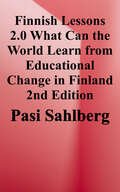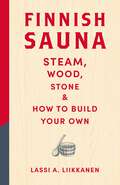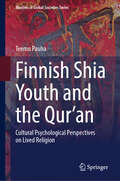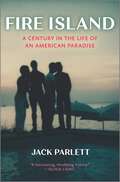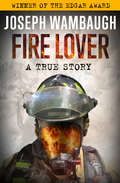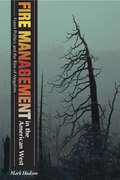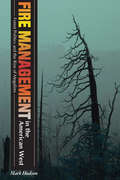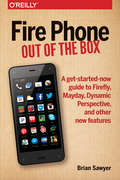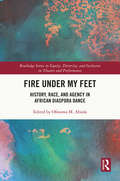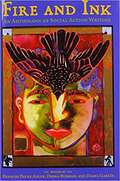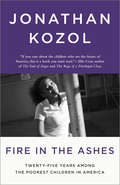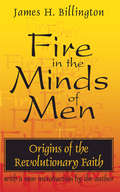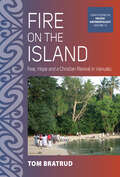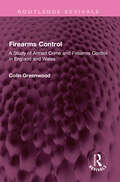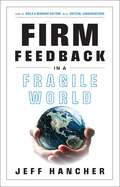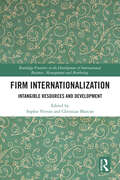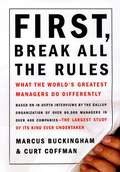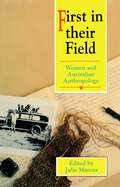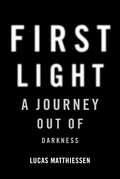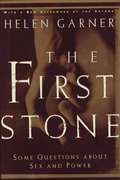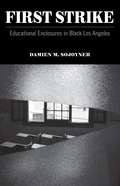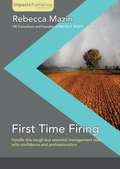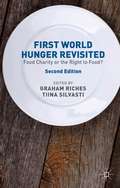- Table View
- List View
Finnish Lessons 2. 0: What Can the World Learn from Educational Change in Finland?
by Pasi SahlbergWith Finnish Lessons 2.0, the author Pasi Sahlberg has thoroughly updated his groundbreaking account of how Finland built a world-class education system during the past four decades. <p><p>In this international bestseller, the author traces the evolution of Finnish education policies and highlights how they differ from the United States and much of the rest of the world. Featuring substantial additions throughout the text, Finnish Lessons 2.0 demonstrates how systematically focusing on teacher and leader professionalism, building trust between the society and its schools, and investing in educational equity rather than competition, choice, and other market-based reforms make Finnish schools an international model of success. <p><p>This second edition details the complexity of meaningful change by examining Finland's educational performance in light of the most recent international assessment data and domestic changes. In the midst of continuous local reforms and global changes, Finnish Lessons 2.0 encourages educators, students, and policymakers to look beyond their own borders as they seek successful solutions for their education systems, districts, and schools.
Finnish Sauna: Steam, Wood, Stone and How to Build Your Own
by Lassi A. LiikkanenAs the old Finnish proverb has it: First build the sauna. Then the house.More and more people around the world are rediscovering an ancient secret to wellbeing, relaxation and stress relief: the humble sauna. By gently raising the heart rate and relaxing muscles, the magical steam that rises from the heated stones - what Finns call löyly - has improved quality of life in the Nordic region for millennia.In this practical guide, leading global expert Lassi Liikkanen teaches us how to plan, build and maintain a new sauna, with detail on insulation, panelling, and bench construction, and uses the examples of an indoor electric sauna and an outdoor sauna cabin with a wood-burning heater. Along the way, you will learn the traditions and science of sauna, and for the first time Dr Liikkanen introduces his history of Finnish sauna as defined by four eras.Whether you're already planning to build your own, or just beginning to learn of the health benefits of sauna, this book is the perfect introduction to löyly and the very Finnish art of living well. Prepare to embrace the deep sense of calm and connection that comes from this simple marriage of steam, wood and stone.
Finnish Sauna: Steam, Wood, Stone and How to Build Your Own
by Lassi A. LiikkanenAs the old Finnish proverb has it: First build the sauna. Then the house.More and more people around the world are rediscovering an ancient secret to wellbeing, relaxation and stress relief: the humble sauna. By gently raising the heart rate and relaxing muscles, the magical steam that rises from the heated stones - what Finns call löyly - has improved quality of life in the Nordic region for millennia.In this practical guide, leading global expert Lassi Liikkanen teaches us how to plan, build and maintain a new sauna, with detail on insulation, panelling, and bench construction, and uses the examples of an indoor electric sauna and an outdoor sauna cabin with a wood-burning heater. Along the way, you will learn the traditions and science of sauna, and for the first time Dr Liikkanen introduces his history of Finnish sauna as defined by four eras.Whether you're already planning to build your own, or just beginning to learn of the health benefits of sauna, this book is the perfect introduction to löyly and the very Finnish art of living well. Prepare to embrace the deep sense of calm and connection that comes from this simple marriage of steam, wood and stone.
Finnish Shia Youth and the Qur’an: Cultural Psychological Perspectives on Lived Religion (Muslims in Global Societies Series #13)
by Teemu PauhaThis book investigates the role of the Qur’an in the everyday lives of young Shia Muslims in Finland. Adopting a cultural psychological perspective on Islamic scripture, the book approaches the Qur’an as a symbolic resource that young Muslims can draw on to find guidance and support, to reflect on the meaning and purpose in their lives, or to experience community with other believers. The book emphasizes the variety of ways in which young Shia Muslims relate to the scripture, bringing to life the various ways in which young Shia Muslims grapple with a text that is difficult to understand and try to construct a meaning that makes it relevant in the context of contemporary Finland. This book provides a novel approach to the religious lives of a little-known religious minority. In addition, it brings together fields that have so far been largely separate, in particular cultural psychology and Islamic studies. As such, the book provides a valuable resource to scholars interested in lived religion, religious minorities, Islam in Europe, sacred texts, as well as culture and human mind.
Fire Island: A Century in the Life of an American Paradise
by Jack Parlett*A Washington Post &“Book to Read This Summer&”**AN ADVOCATE BEST LGBTQ+ BOOK OF 2022*A groundbreaking account of New York's Fire Island, chronicling its influence on art, literature, culture and queer liberation over the past centuryFire Island, a thin strip of beach off the Long Island coast, has long been a vital space in the queer history of America. Both utopian and exclusionary, healing and destructive, the island is a locus of contradictions, all of which coalesce against a stunning ocean backdrop.Now, poet and scholar Jack Parlett tells the story of this iconic destination—its history, its meaning and its cultural significance—told through the lens of the artists and creators who sought refuge on its shores. Together, figures as divergent as Walt Whitman, Oscar Wilde, James Baldwin, Carson McCullers, Frank O'Hara, Patricia Highsmith and Jeremy O. Harris tell the story of a queer space in constant evolution.Transporting, impeccably researched and gorgeously written, Fire Island is the definitive book on an iconic American destination and an essential contribution to queer history.
Fire Lover: A True Story (Basic Ser.)
by Joseph WambaughThe hunt forthe most prolific American arsonist of the twentieth century—in this Edgar Award–winning true crime story that&’s &“stranger than fiction&” (The New York Times). From Joseph Wambaugh, the #1 New York Times–bestselling author of such classics as The Onion Field and The Choirboys, comes the extraordinary story of the chase for the &“Pillow Pyro,&” led by one ambitious firefighter. Growing up in Los Angeles, John Orr idolized law enforcement. However, after being rejected by both the LAPD and LAFD, he settled for a position with the Glendale Fire Department. There, he rose through the ranks, eventually becoming a fire captain and one of Southern California&’s best-known and most respected arson investigators. But Orr led another, unseen life, one that included womanizing and an insatiable thirst for recognition. While Orr busted a slew of petty arsonists, there was one serial criminal he could not track down. Nothing was safe from the so-called Pillow Pyro&’s obsession. Homes, retail stores, and fields of dry brush all went up in flames. His handiwork led to millions of dollars worth of property damage and the deaths of four innocent bystanders. But after years of evading the police, he made a mistake—one that would turn Orr&’s life upside down. The Washington Post raves, &“When [Joseph Wambaugh] talks about the culture of cops versus the culture of firemen, we get no speculation, only hard-earned details.&” Based on meticulous research, interviews, case records, and thousands of pages of court transcripts, Fire Lover is Wambaugh at his best.
Fire Management in the American West
by Mark HudsonMost journalists and academics attribute the rise of wildfires in the western United States to the USDA Forest Service's successful fire-elimination policies of the twentieth century. However, in Fire Management in the American West, Mark Hudson argues that although a century of suppression did indeed increase the hazard of wildfire, the responsibility does not lie with the USFS alone. The roots are found in the Forest Service's relationships with other, more powerful elements of society--the timber industry in particular. Drawing on correspondence both between and within the Forest Service and the major timber industry associations, newspaper articles, articles from industry outlets, and policy documents from the late 1800s through the present, Hudson shows how the US forest industry, under the constraint of profitability, pushed the USFS away from private industry regulation and toward fire exclusion, eventually changing national forest policy into little more than fire policy. More recently, the USFS has attempted to move beyond the policy of complete fire suppression. Interviews with public land managers in the Pacific Northwest shed light on the sources of the agency's struggles as it attempts to change the way we understand and relate to fire in the West. Fire Management in the American West will be of great interest to environmentalists, sociologists, fire managers, scientists, and academics and students in environmental history and forestry.
Fire Management in the American West: Forest Politics and the Rise of Megafires (G - Reference, Information And Interdisciplinary Subjects Ser.)
by Mark HudsonMost journalists and academics attribute the rise of wildfires in the western United States to the USDA Forest Service's successful fire-elimination policies of the twentieth century. However, in Fire Management in the American West, Mark Hudson argues that although a century of suppression did indeed increase the hazard of wildfire, the responsibility does not lie with the USFS alone. The roots are found in the Forest Service's relationships with other, more powerful elements of society--the timber industry in particular. Drawing on correspondence both between and within the Forest Service and the major timber industry associations, newspaper articles, articles from industry outlets, and policy documents from the late 1800s through the present, Hudson shows how the US forest industry, under the constraint of profitability, pushed the USFS away from private industry regulation and toward fire exclusion, eventually changing national forest policy into little more than fire policy. More recently, the USFS has attempted to move beyond the policy of complete fire suppression. Interviews with public land managers in the Pacific Northwest shed light on the sources of the agency's struggles as it attempts to change the way we understand and relate to fire in the West. Fire Management in the American West will be of great interest to environmentalists, sociologists, fire managers, scientists, and academics and students in environmental history and forestry.
Fire Phone: A get-started-now guide to Firefly, Mayday, Dynamic Perspective, and other new features
by Brian SawyerDive straight into hot Fire phone features you won’t find in any other device—like Firefly, Mayday, and Dynamic Perspective—with this concise hands-on guide. You probably already know how to make calls, text, and take photos with Amazon’s new phone, but where it really shines is in innovative features you’ve never even seen before. This intuitive, easy-to-follow book opens a world of possibilities with the Fire phone, right out of the box.Instantly identify and order just about any product with Firefly—from DVDs, CDs, and books (or their electronic equivalents) to nearly anything else with a barcodeUse Mayday to get live, hands-on tech support and customer service right on your phoneImmerse yourself in 3D games, maps, and apps with the Dynamic Perspective sensor systemNavigate easily with new one-handed (and no-handed!) gestures found only on Fire phone
Fire Under My Feet: History, Race, and Agency in African Diaspora Dance (Routledge Series in Equity, Diversity, and Inclusion in Theatre and Performance)
by Ofosuwa M. AbiolaFire Under My Feet seeks to expose the diverse, significant, and often under-researched historical and developmental phenomena revealed by studies in the dance systems of the African Diaspora. In the book, written documentation and diverse methodologies are buttressed by the experiences of those whose lives are built around the practice of African diaspora dance. Replete with original perspectives, this book makes a significant contribution to dance and African diaspora scholarship simultaneously. Most important, it highlights the work of researchers from Ecuador, India, Puerto Rico, the United States, and the United Kingdom, and it exposes under-researched and omitted voices of the African diaspora dance world of the aforesaid locations and Puerto Rico, Columbia, and Trinidad as well. This study showcases a blend of scholars, dance practitioners, and interdisciplinarity, and engages the relationship between African diaspora dance and the fields of history, performance studies, critical race theory, religion, identity, and black agency.
Fire and Ink: An Anthology of Social Action Writing
by Debra Busman Frances Payne Adler Diana GarcíaFire and Ink is a powerful and impassioned anthology of stories, poems, interviews, and essays that confront some of the most pressing social issues of our day. Designed to inspire and inform, this collection embodies the concepts of “breaking silence,” “bearing witness,” resistance, and resilience. Beyond students and teachers, the book will appeal to all readers with a commitment to social justice. <P><P> Fire and Ink brings together, for the first time in one volume, politically engaged writing by poets, fiction writers, and essayists. Including many of our finest writers—Martín Espada, Adrienne Rich, June Jordan, Patricia Smith, Gloria Anzaldúa, Sharon Olds, Arundhati Roy, Sonia Sanchez, Carolyn Forche, Chitra Banerjee Divakaruni, Alice Walker, Linda Hogan, Gary Soto, Kim Blaeser, Minnie Bruce Pratt, Li-Young Lee, and Jimmy Santiago Baca, among others—this is an indispensable collection. <P><P> This groundbreaking anthology marks the emergence of social action writing as a distinct field within creative writing and literature. Featuring never-before-published pieces, as well as reprinted material, Fire and Ink is divided into ten sections focused on significant social issues, including identity, sexuality and gender, the environment, social justice, work, war, and peace. The pieces can often be gripping, such as “Frame,” in which Adrienne Rich confronts government and police brutality, or Chris Abani’s “Ode to Joy,” which documents great courage in the face of mortal danger. <P><P> Fire and Ink serves as a wonderful reader for a wide range of courses, from composition and rhetoric classes to courses in ethnic studies, gender studies, American studies, and even political science, by facing a past that was often accompanied by injustice and suffering. But beyond that, this collection teaches us that we all have the power to create a more equitable and just future.
Fire in the Ashes: Twenty-Five Years Among the Poorest Children in America
by Jonathan KozolIn this powerful and culminating work about a group of inner-city children he has known for many years, Jonathan Kozol returns to the scene of his prize-winning books Rachel and Her Children and Amazing Grace, and to the children he has vividly portrayed, to share with us their fascinating journeys and unexpected victories as they grow into adulthood. For nearly fifty years Jonathan has pricked the conscience of his readers by laying bare the savage inequalities inflicted upon children for no reason but the accident of being born to poverty within a wealthy nation. A winner of the National Book Award, the Robert F. Kennedy Book Award, and countless other honors, he has persistently crossed the lines of class and race, first as a teacher, then as the author of tender and heart-breaking books about the children he has called "the outcasts of our nation's ingenuity." But Jonathan is not a distant and detached reporter. His own life has been radically transformed by the children who have trusted and befriended him. Never has this intimate acquaintance with his subjects been more apparent, or more stirring, than in Fire in the Ashes, as Jonathan tells the stories of young men and women who have come of age in one of the most destitute communities of the United States. Some of them never do recover from the battering they undergo in their early years, but many more battle back with fierce and, often, jubilant determination to overcome the formidable obstacles they face. As we watch these glorious children grow into the fullness of a healthy and contributive maturity, they ignite a flame of hope, not only for themselves, but for our society. The urgent issues that confront our urban schools - a devastating race-gap, a pathological regime of obsessive testing and drilling students for exams instead of giving them the rich curriculum that excites a love of learning - are interwoven through these stories. Why certain children rise above it all, graduate from high school and do well in college, while others are defeated by the time they enter adolescence, lies at the essence of this work. Jonathan Kozol is the author of Death at an Early Age, Savage Inequalities, and other books on children and their education. He has been called "today's most eloquent spokesman for America's disenfranchised." But he believes young people speak most eloquently for themselves; and in this book, so full of the vitality and spontaneity of youth, we hear their testimony.
Fire in the Minds of Men: Origins of the Revolutionary Faith
by James H BillingtonThis book traces the origins of a faith--perhaps the faith of the century. Modern revolutionaries are believers, no less committed and intense than were Christians or Muslims of an earlier era. What is new is the belief that a perfect secular order will emerge from forcible overthrow of traditional authority. This inherently implausible idea energized Europe in the nineteenth century, and became the most pronounced ideological export of the West to the rest of the world in the twentieth century. Billington is interested in revolutionaries--the innovative creators of a new tradition. His historical frame extends from the waning of the French Revolution in the late eighteenth century to the beginnings of the Russian Revolution in the early twentieth century. The theater was Europe of the industrial era; the main stage was the journalistic offices within great cities such as Paris, Berlin, London, and St. Petersburg. Billington claims with considerable evidence that revolutionary ideologies were shaped as much by the occultism and proto-romanticism of Germany as the critical rationalism of the French Enlightenment. The conversion of social theory to political practice was essentially the work of three Russian revolutions: in 1905, March 1917, and November 1917. Events in the outer rim of the European world brought discussions about revolution out of the school rooms and press rooms of Paris and Berlin into the halls of power.Despite his hard realism about the adverse practical consequences of revolutionary dogma, Billington appreciates the identity of its best sponsors, people who preached social justice transcending traditional national, ethnic, and gender boundaries. When this book originally appeared The New Republic hailed it as "remarkable, learned and lively," while The New Yorker noted that Billington "pays great attention to the lives and emotions of individuals and this makes his book absorbing." It is an invaluable work of history and contribution to our understanding of political life.
Fire on the Island: Fear, Hope and a Christian Revival in Vanuatu (ASAO Studies in Pacific Anthropology #13)
by Tom BratrudIn 2014, the island of Ahamb in Vanuatu became the scene of a startling Christian revival movement led by thirty children with ‘spiritual vision’. However, it ended dramatically when two men believed to be sorcerers and responsible for much of the society’s problems were hung by persons fearing for the island’s future security. Based on twenty months of ethnographic fieldwork on Ahamb between 2010 and 2017, this book investigates how upheavals like the Ahamb revival can emerge to address and sometimes resolve social problems, but also carry risks of exacerbating the same problems they arise to address.
Fire on the Island: Fear, Hope and a Christian Revival in Vanuatu (ASAO Studies in Pacific Anthropology)
by Tom BratrudIn 2014, the island of Ahamb in Vanuatu became the scene of a startling Christian revival movement led by thirty children with ‘spiritual vision’. However, it ended dramatically when two men believed to be sorcerers and responsible for much of the society’s problems were hung by persons fearing for the island’s future security. Based on twenty months of ethnographic fieldwork on Ahamb between 2010 and 2017, this book investigates how upheavals like the Ahamb revival can emerge to address and sometimes resolve social problems, but also carry risks of exacerbating the same problems they arise to address.
Firearms Control: A Study of Armed Crime and Firearms Control in England and Wales (Routledge Revivals)
by Colin GreenwoodFirst published in 1972 Firearms Control is the result of research carried out at the Cambridge University Institute of Criminology, looks at the various problems involved in firearms control. Chief Inspector Greenwood, a serving police officer, makes use, in his investigation of the problem, of fascinating material not previously published or largely forgotten. He reveals massive and dangerous shortcomings in the official statistics, and his detailed and original findings show how badly the problem has been misunderstood. He examines closely current legislation and current policies, showing the effort they involve and the product of that effort. The findings of Firearms Control call into question many of the attitudes and theories which have hitherto been unquestioningly accepted. Colin Greenwood here recommends radical changes both in legislative and administrative attitudes to firearms control, with a view to reducing the burden on the police there by permitting them to devote their time to methods which are likely to be productive. The book will command attention of legislators and police, sociologists, statisticians, lawyers, and laymen.
Firm Feedback in a Fragile World: How to Build a Winning Culture with Critical Conversations
by Jeff HancherTurn dreaded workplace feedback into opportunities for growth and trust with Firm Feedback in a Fragile World, your guide to fostering stronger teams and a thriving workplace through effective, confident communication.&“We need to talk.&” It&’s a phrase that can fill us with dread. For many, the statement signals conflict or criticism. But what if it didn&’t? What if feedback and conversations in your workplace inspired growth, built trust, and created thriving teams? In Firm Feedback in a Fragile World, Jeff Hancher redefines how we approach feedback in the workplace. Combining relatable stories, research, and practical tools, Hancher offers a roadmap to turn feedback from a source of tension into a powerful leadership tool. As a military veteran, corporate leader, and leadership coach, he provides actionable insights that help leaders and employees alike navigate feedback with confidence and clarity. This book equips readers with tools to— Understand why feedback often fails and how to overcome common fears and resistance. Deliver feedback in various styles, including directive, collaborative, and supportive approaches. Build strong relationships that lay the foundation for effective feedback. Set clear expectations, consequences, and accountability measures for lasting impact. Develop self-awareness and eliminate blind spots to grow as a leader. With reflection questions and hands-on activities, this book empowers readers to create a workplace culture where giving and receiving feedback is no longer dreaded but embraced as a pathway to growth. Transform your leadership legacy by making feedback your gift to others.
Firm Internationalization: Intangible Resources and Development (Routledge Frontiers in the Development of International Business, Management and Marketing)
by Sophie Nivoix Christian MarconIn a fast-moving, globalized world, companies need to develop contingent plans. This book, by analyzing the practical aspects of creating and using intangible resources for international development, offers original and relevant insights on this subject. The book offers a comprehensive analysis of the theoretical and practical aspects of using and developing intangible resources when a firm expands its international business operations. The book also sheds light on the understanding of various dimensions of intangible resources and their impacts on the efficiency and sustainability of firms. To investigate these issues, the book addresses topics that have usually either not been given enough attention, hence not sufficiently investigated, or not yet been researched at all. It refers to a broad variety of issues, including theoretical and empirical aspects of the role of intangible assets in firm internationalization. These include the reticular resources implemented by international management, methods of mobilizing cultural resources internationally, as well as the specifics of small and medium-sized enterprises in various country contexts, particularly in emerging economies. Firm Internationalization: Mobilization of Intangible Resources will be valuable reading for scholars, researchers, and academics in the fields of international business and strategic management in particular.
First Break All the Rules: What the World's Greatest Managers Do Differently
by Marcus Buckingham Curt Coffman"Finally, something definitive about what makes for a great workplace." - Harriet Johnson Brackey, Miami Herald
First In Their Field: Women and Australian Anthropology
by Julie MarcusThe image of early women anthropologists in Australia has been one of Daisy Bates seated in the middle of nowhere, recording the habits and customs of 'a dying race'. A harmless eccentric, or a serious pioneer of field anthropology? When anthropology began as a serious academic discipline in Sydney in the 1920s, its lecturers and theoreticians were male. Yet much of the fieldwork and research was carried out by women whose contribution remains marginalised or omitted from the history of anthropology. In First in their Field seven distinguished women writers look at the way those remarkable women worked, their difficulties and their hopes. This volume, documenting their courage and determination, is long overdue.
First Light: A Journey Out of Darkness
by Lucas MatthiessenA deeply felt literary memoir of one man&’s journey to redemption through vision loss, alcoholism, and the burden of a family legacy. Born to the author Peter Matthiessen, young Lucas traveled through life believing himself a disappointment to his famous father. From an early age, Lucas was exposed to the fanciful ideas of his parent&’s group of renowned bohemians as well as to their addictive pastimes. Within the shadow of his father&’s professional success came another source of darkness—the deterioration of Lucas&’s vision from retinitis pigmentosa. With blindness looming imminently, Lucas spirals downward, unsure of how to turn his degree in English Literature into a job and relying more and more on alcohol. As Lucas&’ drinking and eyesight worsen, so too do his interpersonal relationships and first career in publishing.First Light is a memoir of loss and learning. By pulling himself out of addiction and accepting that he will lose his sight completely, Lucas transitions from being &“the son of&” someone famous to an individual with his own strong sense of self. Despite continued personal tragedies, Lucas develops a second sight that is aimed inward, laying his triumphs and failures bare.With great honesty, Lucas Matthiessen creates a vivid portrait of self-destruction and rebirth, which is, above all, a vision of hope.
First Stone: Some Questions about Sex and Power
by Helen GarnerHelen Garner delves into the causes and effects of police charges pressed against the Master of Ormond College by two female students who claimed he fondled them at a school function. Two overriding questions trouble Ms. Garner throughout her investigations: why did these students choose to go to the police instead of having the matter settled through the school's private arbitration process, and why, when the Master was found innocent of these charges, was he terminated from his position? The First Stone is a call for hard-line feminists to grow up and get conscious. It asks for a new kind of feminism based on the cultivation of an individual's power of self-expression, responsibility, and, indeed, exactly the kind of self-discovery her insightful narrative represents.
First Strike: Educational Enclosures in Black Los Angeles
by Damien M. SojoynerCalifornia is a state of immense contradictions. Home to colossal wealth and long portrayed as a bastion of opportunity, it also has one of the largest prison populations in the United States and consistently ranks on the bottom of education indexes. Taking a unique, multifaceted insider&’s perspective, First Strike delves into the root causes of its ever-expansive prison system and disastrous educational policy. Recentering analysis of Black masculinity beyond public rhetoric, First Strike critiques the trope of the &“school-to-prison pipeline&” and instead explores the realm of public school as a form of &“enclosure&” that has influenced the schooling (and denial of schooling) and imprisonment of Black people in California. Through a fascinating ethnography of a public school in Los Angeles County, and a &“day in the life tour&” of the effect of prisons on the education of Black youth, Damien M. Sojoyner looks at the contestation over education in the Black community from Reconstruction to the civil rights and Black liberation movements of the past three decades. Policy makers, school districts, and local governments have long known that there is a relationship between high incarceration rates and school failure. First Strike is the first book that demonstrates why that connection exists and shows how school districts, cities and states have been complicit and can reverse a disturbing and needless trend. Rather than rely upon state-sponsored ideological or policy-driven models that do nothing more than to maintain structures of hierarchal domination, it allows us to resituate our framework of understanding and begin looking for solutions in spaces that are readily available and are immersed in radically democratic social visions of the future.
First Time Firing
by Rebecca MazinFiring someone is never easy; it shouldn't be. The key to minimizing sweaty palms and the chance of stuttering through a statement is remembering that this is a business decision, and a business conversation. It requires preparation and planning for success. First Time Firing will provide you with clear and practical guidance to making termination decisions and acting on them. It will take you from making that first decision of the process, through preparing notes and recommendations, to delivering the news with confidence. Firing people is a difficult but necessary management task; it is essential that you maintain your professionalism and keep the needs of the business at the forefront of your mind. This hands-on guide is the perfect companion that will help you to do exactly that. Beginning with helpful advice on making a termination decision, HR expert Rebecca Mazin breaks down the process from the initial decision, through to planning and conducting the meeting, and then guides you through the necessary steps afterwards. With real life examples to illustrate best practices, First Time Firing takes a concise and logical approach giving you the confidence to handle a termination. About the Author: With more than 20 years of expertise, Rebecca Mazin formed RECRUIT RIGHT to create usable solutions for employers to meet increasingly complicated human resources challenges. Her clients benefit from clear guidance, tools, and techniques that quickly cut through fads, jargon, and complex regulatory issues. RECRUIT RIGHT consulting, training, and written communications produce measurable results in a wide range of businesses and not-for-profit organizations from small startups to industry giants. Rebecca uses her passion for demystifying human resources issues to write content accessible for business owners, managers, and HR pros. She is the author of The Employee Benefits Answer Book: An Indispensable Guide for Managers and Business Owners published by Pfeiffer in 2010 and the co-author of The HR Answer Book: An Indispensable Guide for Managers and Human Resources Professionals published by AMACOM in 2004 with a revised edition issued in 2011. Her advice and commentary appears in business publications, industry and trade journals, and Rebecca is a featured expert on the award winning www.AllBusiness.com website. Follow Rebecca on Twitter at @thehranswer. Prior to founding RECRUIT RIGHT, she held key management positions at major organizations. Her experience with Millennium Hotels and Hyatt Hotels Corporation built on her work at Owens Corning and the U.S. Federal Government at the National Labor Relations Board. Rebecca is a graduate of Cornell University with a degree in Labor Relations. She is a certified facilitator of Achieve Global training programs. Rebecca is active in the community, where she uses her skills and talents to enhance organizational effectiveness and outcomes. Rebecca was board co-chair for MTS, a non-profit that hired, trained and placed individuals with HIV Aids and has held board positions with The Junior League of Westchester on the Sound. She currently serves on the board of Furniture Sharehouse, Westchester's Furniture Bank.
First World Hunger Revisited
by Graham Riches Tiina SilvastiIs food aid the way of the future? What are the prospects for integrated public policies informed by the right to food? First World Hunger Revisited investigates the rise of food charity and corporately sponsored food banks as effective and sustainable responses to increasing hunger and food poverty in twelve rich 'food-secure' societies.
